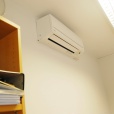In a previous article “UK Heat Pump Installations On The Rise” we looked at the government’s announcement regarding the Boiler Upgrade Scheme (BUS) and the increase of the grant level for air source heat pumps and ground source heat pumps from £5,000 (air source) and £6,000 (ground source) to £7,500 from September 2023. Following this announcement figures published by the government in November 2023 showed a surge in heat pump applications “more than 3 times higher than the average weekly rate prior to the change” with applications remaining “nearly 60% higher than the previous weekly average.”
The government have continued to encourage homeowners to make their properties warmer, smarter and more energy efficient through their “Welcome Home Energy Efficiency” campaign on TV, Facebook, and other advertising platforms. The campaign focuses on a number of ways to do this including moving from traditional boilers to heat pumps pointing out that “heat pumps use proven technology to provide homes with cleaner electricity and are significantly more efficient than traditional boilers so will reduce your home’s energy usage.” They go on to say that “there is a 70% carbon reduction when you compare with a traditional gas boiler.”
Latest Boiler Upgrade Scheme Figures
In March 2024 the government published the statistics for the capital grant uptake for the installation of heat pumps in domestic and non-domestic properties. These latest figures continue to show that applications for heat pumps increased by 75% up to 29 February 2024 when compared to the same time last year. The monthly average for heat pump applications between November 2023 and February 2024 was 45% higher than the average monthly figures before the grant level was increased. There has now been 35,741 applications and funding of £127 million has been paid out to customers up to the end of February 2024.
Claire Coutinho the Energy Security Secretary explains “With the right support – like the 50% increase in heat pump grants – families can make their homes warmer and cut their emissions without breaking the bank. Figures out today show that our plan is working with applications up by 75% from last year.”
Minister for Energy Efficiency and Green Finance Lord Callanan said “Demand for heat pumps is soaring, as we make it easier than ever to make the switch to electric heating without big upfront costs. Our boosted £7,500 grants are helping people create a warm home and lower their emissions. And with applications up 75%, it’s clear our approach is hugely popular with many families.”
The CEO of the Heat Pump Association Charlotte Lee is quoted as saying “Heat pumps provide a very efficient, effective solution to decarbonising home heating and enhance the UK’s energy security, and it is wonderful to see interest and awareness from consumers increasing.”
Greg Jackson, Founder of Octopus Energy is also quoted and describes “Heat pumps [as] about four times more efficient than old fashioned gas boilers”. He goes onto say that “the UK is way behind other countries. Now, thanks to the government scheme, they can be cheaper than boilers and more and more customers are joining the queue to get one.”
What Is a Heat Pump?
Let’s remind ourselves of what a heat pump is. A heat pump is an energy efficient and low-carbon way of heating your home. According to the Electrification of Heat Demonstration (EoH) project funded by the UK Government Department for Business, Energy and Industrial Strategy (BEIS) and part of the government’s Energy Innovation Programme “All housing types are suitable for heat pumps, from Victorian mid-terraces to pre-WWII semis and a 1960s block of flats – the project has proven that heat pumps can be successfully installed in homes from every style and era” and as they produce more heat energy than they use in electricity they are energy efficient saving you money when you replace a traditional boiler.
In simple terms a heat pump takes heat from the air or ground, uses electricity to raise the temperature and transfers it into a property through a four-step process of evaporation, compression, condensation and expansion, known as the refrigeration cycle or vapour compression cycle, to provide heating and hot water.
The evaporation step involves drawing in heat from the air or ground and transferring it to a heat exchanger which contains a refrigerant. The refrigerant which is in liquid form absorbs the heat and evaporates into a gas. In the compression step the gas is transferred to a compressor which increases the gas pressure which raises the temperature. In the condensation step the gas circulates through a heat exchanger which transfers the heat into water which is heated until it reaches the right temperature and is then circulated to radiators and underfloor heating. When the heat is transferred the refrigerant cools down and returns to its liquid state. In the final expansion step the cooled refrigerant travels through the expansion valve causing a lowering of pressure and the refrigerant is then pumped back to the heat exchanger to repeat the cycle.
There are two main types of heat pumps, air and ground source. An air source heat pump, also called an air-to-water heat pump, absorbs heat from the air outside via a heat exchanger. During the winter when the air temperature is lower energy is still able to be generated as air source heat pumps continue to work even down to temperatures as low as -25°C. As much as it’s hard to believe heat is present in air that has a temperature higher than –270°C. The second type of heat pump is a ground source heat pump which transfers the heat energy from the ground through underground pipes filled with a water antifreeze mixture. The heat energy is then transferred to the homes heating and water system via a heat exchanger.
Air source heat pumps tend to be the most common type of heat pump installed.
Why Should I Consider Replacing My Boiler For A Heat Pump?
Heat pumps come with many benefits including:
Reduction In Energy Bills
Heat pumps are more energy efficient. As a consequence energy bills are more likely to be lower when compared to oil, gas, or electric heating.
According to E.ON “While the upfront cost of a heat pump is significant, typically starting at around £6,000, the annual savings can be considerable, particularly if you’re changing from old-fashioned systems. An air source heat pump could save up to £1,330 per year compared to old electric storage heaters, or up to £1,410 per year compared to an old LPG boiler.”
Increased Equipment Life
A gas boiler will typically last around 10-15 years. A heat pump can potentially last twice as long, up to 20-25 years, if maintained properly.
Less Maintenance
Gas boilers usually require an annual maintenance. Heat pumps have a lower maintenance requirement of around 3-5 years as they have fewer components.
Reduce Your Carbon Footprint
As heat pumps are more energy efficient than other heating systems and use approximately a quarter of the energy needed compared to a gas boiler they produce less carbon emissions. Heat pumps can also be powered by solar panels to utilise renewable, sustainable green energy reducing your carbon footprint even lower.
No Need For Fuel Storage
Having a heat pump means that where a property used oil or LPG there is no longer a need to deal with fuel deliveries or have a space to store fuel.
Suitable For New Builds, Renovations and Retrofits
Heat pumps are ideal for new builds, and they can also be considered for renovations, where old boilers need to be replaced or retrofitted to your existing heating system. With changes to the Boiler Upgrade Scheme criteria homes also no longer need to have cavity wall or loft insulation providing greater flexibility in those homes that qualify. It’s important to note though that properties should still aim to be well insulated to get the most from their heat pump installation.
Government Support
The government is offering grants of £7,500 towards the cost of a heat pump to properties across England and Wales through the BUS. There is currently 0% VAT on the installation of heat pumps and biomass boilers, which will last for 5 years, further reducing the cost of installation.
Homeowners can also get support to improve their property’s energy efficiency through the Great British Insulation Scheme and Energy Company Obligation (ECO) which are government energy-efficiency schemes administered by Ofgem, designed to deliver improvements to the least energy-efficient homes to tackle fuel poverty and reduce carbon emissions.
Get Ahead
A heat pump is an investment in your home, one which provides your property with the latest technology and heating innovations. It’s also important to note that the UK government, through its Heat and Buildings Strategy, are looking to phase out new gas boiler installations from 2035 which means that when it comes time to replace your gas boiler, after this date, you’ll no longer be able to install a new gas boiler and will have to choose an alternative option.
Heat Pump Resources – Suitability, Eligibility, Q&As and Visit A Heat Pump
The UK government website provides a number of resources regarding heat pumps which allow homeowners to check if their home is suitable for a heat pump and they’re eligibility for a heat pump grant.
The suitability checker takes you through a series of questions including what type of home you have, when your home was built, the main type of external wall construction in your home, the approximate floor area, how many bedrooms your home has, the type of roof your property has, the main type of window glazing in your home, whether your property has any outdoor space on the ground floor and the fuel your current heating system uses before presenting you with a result to let you know what type of heat pump would best suit your property.
The eligibility checker checks you own the property you’re applying for (including if it’s a business, a second home, or a property you rent out to tenants) and are replacing a fossil fuel heating systems – such as oil, gas, electric or LPG (liquefied petroleum gas). Your property must have a valid Energy Performance Certificate (EPC).
To apply for a grant, the UK government advises contacting a suitable air source heat pump installer, confirming your eligibility with the installer and agreeing a quote. If your grant is agreed via Ofgem the value of the grant will be taken off the amount you have to pay for installation.
The governments “Heat pumps explained: experts answer your questions” answers some of the most common questions around heat pumps including how much do heat pumps cost, do heat pumps make a noise, do heat pumps work in cold weather and do heat pumps work in older homes.
Another initiative to help homeowners make an informed decision with regards to the installing a heat pump in their home is the Nesta Visit a heat pump service which says it “is a new service for householders considering installing a heat pump in their homes.” The online platform helps householders to book visits in their local areas where heat pumps are already in use. Anyone interested in a heat pump can search via their postcode, find nearby owners and book a visit to see a heat pump in person. 150 heat pump owners have already signed up to the service from across the UK.
Expert Home Air Conditioning and Heat Pump Advice and Support
Synecore is a home air conditioning and heat pump installation expert in Kent, London, Surrey, Sussex, Essex. We provide installation of high-quality products from leading manufacturers. We offer the best solutions for your home air conditioning installation. There are many affordable options available to homeowners, helping you keep your energy bills down, while having a positive impact on the environment.
It’s worth noting that Synecore offers both design and installation, both of which are critical to the effectiveness of your new heating system, but not all contractors have the in-house facilities to offer both. At Synecore, we have the means to offer a turnkey heat pump design and installation service.
We also offer our customers value and long-term warranties on all heat pump installations for complete peace of mind.
Synecore’s air conditioning experts will complete a survey of your home to determine the current space and discuss your specific needs. To book a free home air conditioning installation survey, please speak to our team on 01795 509 509 or via our contact form.
Subscribe to our newsletter!
Contact us
0845 241 4953
sales@synecore.co.uk
Archives
- May 2024
- January 2024
- December 2023
- November 2023
- October 2023
- September 2023
- August 2023
- July 2023
- June 2023
- May 2023
- April 2023
- March 2023
- February 2023
- January 2023
- December 2022
- November 2022
- October 2022
- September 2022
- August 2022
- July 2022
- June 2022
- May 2022
- April 2022
- March 2022
- February 2022
- January 2022
- December 2021
- November 2021
- October 2021
- September 2021
- August 2021
- July 2021
- June 2021
- May 2021
- April 2021
- March 2021
- February 2021
- January 2021
- December 2020
- November 2020
- October 2020
- September 2020
- August 2020
- July 2020
- June 2020
- May 2020
- April 2020
- March 2020
- February 2020
- January 2020
- December 2019
- October 2019
- September 2019
- August 2019
- July 2019
- June 2019
- May 2019
- April 2019
- March 2019
- February 2019
- November 2018
- October 2018
- September 2018
- August 2018
- July 2018
- May 2018
- April 2018
- March 2018
- February 2018
- January 2018
- December 2017
- October 2017
- August 2017
- June 2017
- April 2017
- March 2017
- February 2017
- January 2017
- December 2016
- November 2016
- October 2016
- September 2016
- August 2016
- July 2016
- May 2016
- April 2016
- March 2016
- February 2016
- January 2016
- December 2015
- November 2015
- October 2015
- September 2015
- July 2015
- June 2015
- May 2015
- April 2015
- September 2014
- August 2014
- July 2014
- June 2014
- April 2014
- March 2014
- February 2014
- January 2014
- December 2013
- November 2013
- September 2013
- August 2013
- July 2013
- June 2013
- April 2013
- March 2013
- February 2013
- January 2013
- December 2012
- November 2012
- October 2012
- September 2012
- August 2012
- July 2012
- June 2012
- May 2012
- April 2012
- March 2012
- February 2012
- January 2012
- December 2011
- November 2011
- October 2011
- September 2011
- August 2011
- July 2011
- June 2011
- May 2011
- April 2011
- March 2011
- February 2011
- January 2011
- December 2010
- September 2010
- July 2010
- June 2010









































Recent Comments